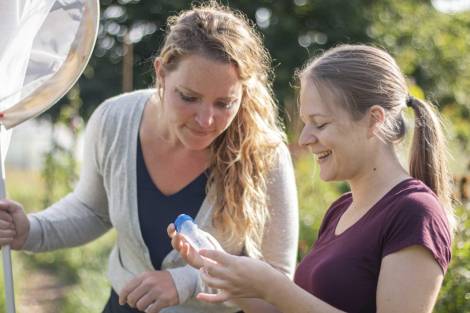Results from this project will be used by farmers to make management decisions about their farm to support pollination services and biodiversity on their land.
Results from this project will be used by farmers to make management decisions about their farm to support pollination services and biodiversity on their land.
Insect pollinators underpin the production of one in three mouthfuls of food (www.1in3mouthfuls.org), and we are becoming even more reliant on their services. Against a background of global pollinator declines, the amount of crops dependent on pollinators is rising yearly. The challenge is how we stop, or ideally reverse, pollinator declines and implement agricultural landscapes that will support healthy and diverse pollinator communities that will continue to sustainably support food production.

A critical first step to address these challenges is to understand the current status of wild pollinators in Ontario. How are species currently distributed? What habitats are they using, and how are these pollinator species and communities changing in response to environmental stress factors – such as, agricultural intensification, habitat loss and fragmentation and climate change?
This research team is monitoring wild pollinators in agricultural and natural areas across much of the province of Ontario to investigate the impacts of agricultural landscapes on pollinator communities. The team is also investigating the impacts of environmental stress factors (such as pesticide exposure) on the behaviour and ecology of pollinators.
A specific aim of this project is to provide evidence that changes to current prevailing farmland management techniques can result in enhanced pollinator, and other, biodiversity in farm-scapes. Critically, we also aim to show that promoting biodiversity through alternative management practices (such as restoring marginal farmland for pollinators) can have tangible benefits for farmers in terms of enhanced crop yield or quality through better pollination and/or biocontrol. Long term datasets tracking the status of pollinator communities in space and time will allow us to critically assess the efficacy of pollinator conservation strategies and support the pollination needs of farmers against the backdrop of a less predictable climate.
Results from this project will be used by farmers to make management decisions about their farm to support pollination services and biodiversity on their land. Project data will also allow decision makers to assess the effectiveness of supporting conservation strategies for pollinators in a range of habitats, including farms. This will allow decision makers to direct their support to the most effective solutions to ameliorate this key issue in food sustainability.
Partners: ALUS Canada.
Collaborators and students: Postdocs: Dr. Ana Montero Castaño, Dr. Elizabeth Franklin, Dr. Alana Pindar; Graduate students: Claire Rubens (MSc), Emily Agar (MSc), Hayley Tompkins (MSc), Janean Sharkey (MSc); Undergraduate students: Sage Handler (BSc).
For more information on this research project, please visit https://1in3mouthfuls.org/